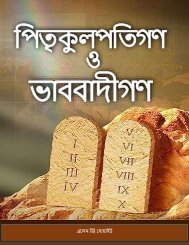Finishing the Race
Of all the games instituted among the Greeks and the Romans, the races were the most ancient and the most highly esteemed … The contests were governed by strict regulations, from which there was no appeal. Those who desired their names entered as competitors for the prize had first to undergo a severe preparatory training. Harmful indulgence of appetite, or any other gratification that would lower mental or physical vigour, was strictly forbidden. For one to have any hope of success in these trials of strength and speed, the muscles must be strong and supple, and the nerves well under control. Every movement must be certain, every step swift and unswerving; the physical powers must reach the highest mark.
Of all the games instituted among the Greeks and the Romans, the races were the most ancient and the most highly esteemed … The contests were governed by strict regulations, from which there was no appeal. Those who desired their names entered as competitors for the prize had first to undergo a severe preparatory training. Harmful indulgence of appetite, or any other gratification that would lower mental or physical vigour, was strictly forbidden. For one to have any hope of success in these trials of strength and speed, the muscles must be strong and supple, and the nerves well under control. Every movement must be certain, every step swift and unswerving; the physical powers must reach the highest mark.
Create successful ePaper yourself
Turn your PDF publications into a flip-book with our unique Google optimized e-Paper software.
train of priests, incense bearers, monks, and soldiers, Morin, <strong>the</strong> royal detective, with <strong>the</strong><br />
traitor, slowly and silently passed through <strong>the</strong> streets of <strong>the</strong> city. The demonstration was<br />
ostensibly in honour of <strong>the</strong> "holy sacrament," an act of expiation for <strong>the</strong> insult put upon <strong>the</strong><br />
mass by <strong>the</strong> protesters. But beneath this pageant a deadly purpose was concealed. On<br />
arriving opposite <strong>the</strong> house of a Lu<strong>the</strong>ran, <strong>the</strong> betrayer made a sign, but no word was<br />
uttered. The procession halted, <strong>the</strong> house was entered, <strong>the</strong> family were dragged forth and<br />
chained, and <strong>the</strong> terrible company went forward in search of fresh victims. They "spared no<br />
house, great or small, not even <strong>the</strong> colleges of <strong>the</strong> University of Paris. . . . Morin made all<br />
<strong>the</strong> city quake. . . . It was a reign of terror." -- Ibid., b. 4, ch. 10.<br />
The victims were put to death with cruel torture, it being specially ordered that <strong>the</strong> fire<br />
should be lowered in order to prolong <strong>the</strong>ir agony. But <strong>the</strong>y died as conquerors. Their<br />
constancy were unshaken, <strong>the</strong>ir peace unclouded. Their persecutors, powerless to move <strong>the</strong>ir<br />
inflexible firmness, felt <strong>the</strong>mselves defeated. "The scaffolds were distributed over all <strong>the</strong><br />
quarters of Paris, and <strong>the</strong> burnings followed on successive days, <strong>the</strong> design being to spread<br />
<strong>the</strong> terror of heresy by spreading <strong>the</strong> executions. The advantage, however, in <strong>the</strong> end,<br />
remained with <strong>the</strong> gospel. All Paris was enabled to see what kind of men <strong>the</strong> new opinions<br />
could produce. There was no pulpit like <strong>the</strong> martyr's pile. The serene joy that lighted up <strong>the</strong><br />
faces of <strong>the</strong>se men as <strong>the</strong>y passed along . . . to <strong>the</strong> place of execution, <strong>the</strong>ir heroism as <strong>the</strong>y<br />
stood amid <strong>the</strong> bitter flames, <strong>the</strong>ir meek forgiveness of injuries, transformed, in instances<br />
not a few, anger into pity, and hate into love, and pleaded with resistless eloquence in behalf<br />
of <strong>the</strong> gospel."--Wylie, b. 13, ch. 20.<br />
The priests, bent upon keeping <strong>the</strong> popular fury at its height, circulated <strong>the</strong> most terrible<br />
accusations against <strong>the</strong> Protestants. They were charged with plotting to massacre <strong>the</strong><br />
Catholics, to overthrow <strong>the</strong> government, and to murder <strong>the</strong> king. Not a shadow of evidence<br />
could be produced in support of <strong>the</strong> allegations. Yet <strong>the</strong>se prophecies of evil were to have a<br />
fulfillment; under far different circumstances, however, and from causes of an opposite<br />
character. The cruelties that were inflicted upon <strong>the</strong> innocent Protestants by <strong>the</strong> Catholics<br />
accumulated in a weight of retribution, and in after centuries wrought <strong>the</strong> very doom <strong>the</strong>y<br />
had predicted to be impending, upon <strong>the</strong> king, his government, and his subjects; but it was<br />
brought about by infidels and by <strong>the</strong> papists <strong>the</strong>mselves. It was not <strong>the</strong> establishment, but<br />
<strong>the</strong> suppression, of Protestantism, that, three hundred years later, was to bring upon France<br />
<strong>the</strong>se dire calamities.<br />
Suspicion, distrust, and terror now pervaded all classes of society. Amid <strong>the</strong> general<br />
alarm it was seen how deep a hold <strong>the</strong> Lu<strong>the</strong>ran teaching had gained upon <strong>the</strong> minds of men<br />
who stood highest for education, influence, and excellence of character. Positions of trust<br />
and honour were suddenly found vacant. Artisans, printers, scholars, professors in <strong>the</strong><br />
universities, authors, and even courtiers, disappeared. Hundreds fled from Paris, selfconstituted<br />
exiles from <strong>the</strong>ir native land, in many cases thus giving <strong>the</strong> first intimation that<br />
<strong>the</strong>y favoured <strong>the</strong> reformed faith. The papists looked about <strong>the</strong>m in amazement at thought of<br />
136


















